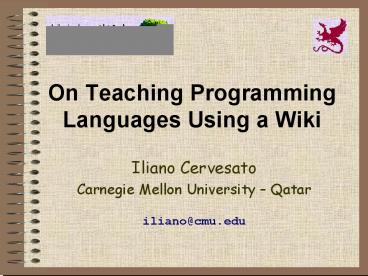On Teaching Programming Languages Using a Wiki - PowerPoint PPT Presentation
1 / 16
Title:
On Teaching Programming Languages Using a Wiki
Description:
Carnegie Mellon University Qatar. iliano_at_cmu.edu. CMU-CS 15-212 'Principles of Programming' ... Sophomore-level CS course. Advanced programming concepts and ... – PowerPoint PPT presentation
Number of Views:82
Avg rating:3.0/5.0
Title: On Teaching Programming Languages Using a Wiki
1
On Teaching Programming Languages Using a Wiki
- Iliano Cervesato
- Carnegie Mellon University Qatar
- iliano_at_cmu.edu
2
CMU-CS 15-212Principles of Programming
- Sophomore-level CS course
- Advanced programming concepts and skills
- Introduced in the early 1990s
- Now, little supporting material
- Notes taken in class
- Few handouts
- Code posted on the web page
- No book!
- Out-of-print or obsolete
- A challenge for many students
Put the material on a wiki
3
Whats a wiki, again?
- the stuff of Wikipedia
- Collaborative framework to create (and share)
information - Simple, transparent editing
- Supports text, images, math, sounds,
- Topic-oriented
- Short articles (compared to book chapter)
- Related topics accessible via links
- Collaborative
- Everybody can be an author
- Mechanisms to avoid abuse
4
The 15-212 Wiki
- Put the whole course on a wiki
- Categorizes and cross-references material
- Detailed explanations of material covered in
class - Lots of examples, exercises
- Further readings
- Pointers to advanced material
- 25 so far (Nov 07 Jan 08)
- Built on MediaWiki (same as Wikipedia)
- Semi-open for editing
- 15-212Q staff and students
- Create, correct, improve articles
- Experts, instructors, students elsewhere
- Upon authorization
Very preliminary
1.5 weeksof material
5
Sample
Code
Graphics
Prose
Formulas
6
Wiki-Based Instruction
- Not just a surrogate for a book!
- A comprehensive didactic tool
- Promotes participatory learning
- Students are encouraged to modify articles
- For play, for curiosity, or for points
- Get them to research topics
- Explain ideas to others (in writing)
- Active participants in the didactic process
- Easy monitoring of students involvement
- Every edit is logged
- We know who did what
- Every access is logged
- Make sure students read the material before
class - More interactive and focused in-class discussion
- No guest account
7
Actual Experiments
- 1 recitation on wiki editing
- 20 of 1st assignment
- Objective 1 play with the mechanics of the wiki
- Objective 2 test research/creativity
8 students
Group A
Group B
Group C
Group D
8
Group A
- Students followed models rather accurately
- Took good advantage of wiki
- Good starting point
- Some humor
- Little creativity
- Shy to experiment
9
Group A (2)
- Same structure
- Was partially given
- Lot less prose
- Ran out of time?
- 2nd week of class
10
Group B
- These students looked up the material and
reported on what they found - No elaboration
- Not integrated within wiki
- Limited use to other students
- Could have written more
11
Group C
- Students did research and found several relevant
documents - Good analysis/synthesis work
- Combine prose and code as appropriate
- Reference sources
- Lots of humor and creativity
- Text at the top of the page
- Cartoon
- Best result
12
Group D
- Students did a search on the web and dumped what
they found - Little post-processing
- No creativity, no fun
- I was not too happy about this one
13
Outcome Summary
- Objective 1 play with mechanics of wiki
- All figured out the basics
- Some did a little extra
- None did more than expected
- Objective 2 test research/creativity
- Research varied from vigorous web search to
minimum needed to adapting example - Creativity ranged from the dull to the
surprising - Altogether
- Students found exercise fun
- Novelty
- Not usual routine
14
The Wiki and 212s Future
- Categorization helps focus on the big picture
- What the course is about
- Problem solving, not ML
- Encourages rearranging material and delivery
- Experiment with what works best
- Case-studies, examples, exercises
- Interplay between problem solving and
programming - Encourage exploring syllabus improvements
- Add/remove topics
- Change language
- A more dynamic course
15
Future Developments
- Add rest of course material
- my summer project
- Continuous improvement cycle
- Extend with try-it capability
- Sandboxed interpreter within wiki
- Pair-up exercises with e-tutor
- Intelligent learning system
- Explore opportunistic learning
16
Opportunistic Learning
- Books, notes often modeled after lecture
- 1 hour long
- Long attention span
- Mostly linear presentation of material
- This is not necessary and probably not efficient
- Wiki breaks away from this model
- Brief topic-oriented articles linked together
- Smaller time granularity for studying/reviewing
(5-20 min) - Harness dead times (commuting, time between
classes, ) - Focus on actual dependencies
- Make it mobile
- Reformat wiki for viewing on PDAs, smartphones
- Add matching video segments of lecture, slides,

